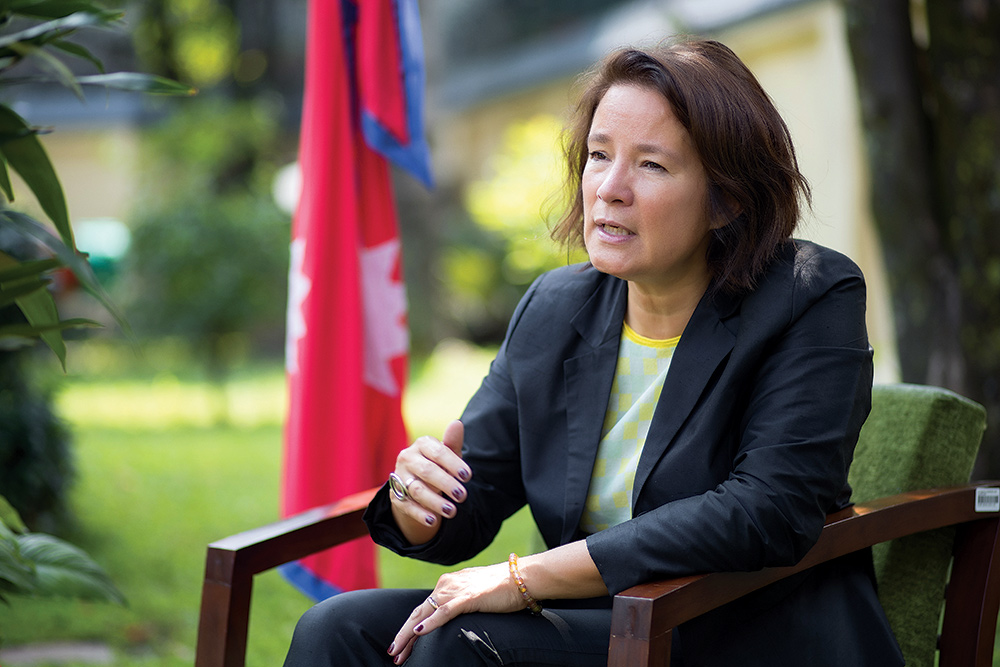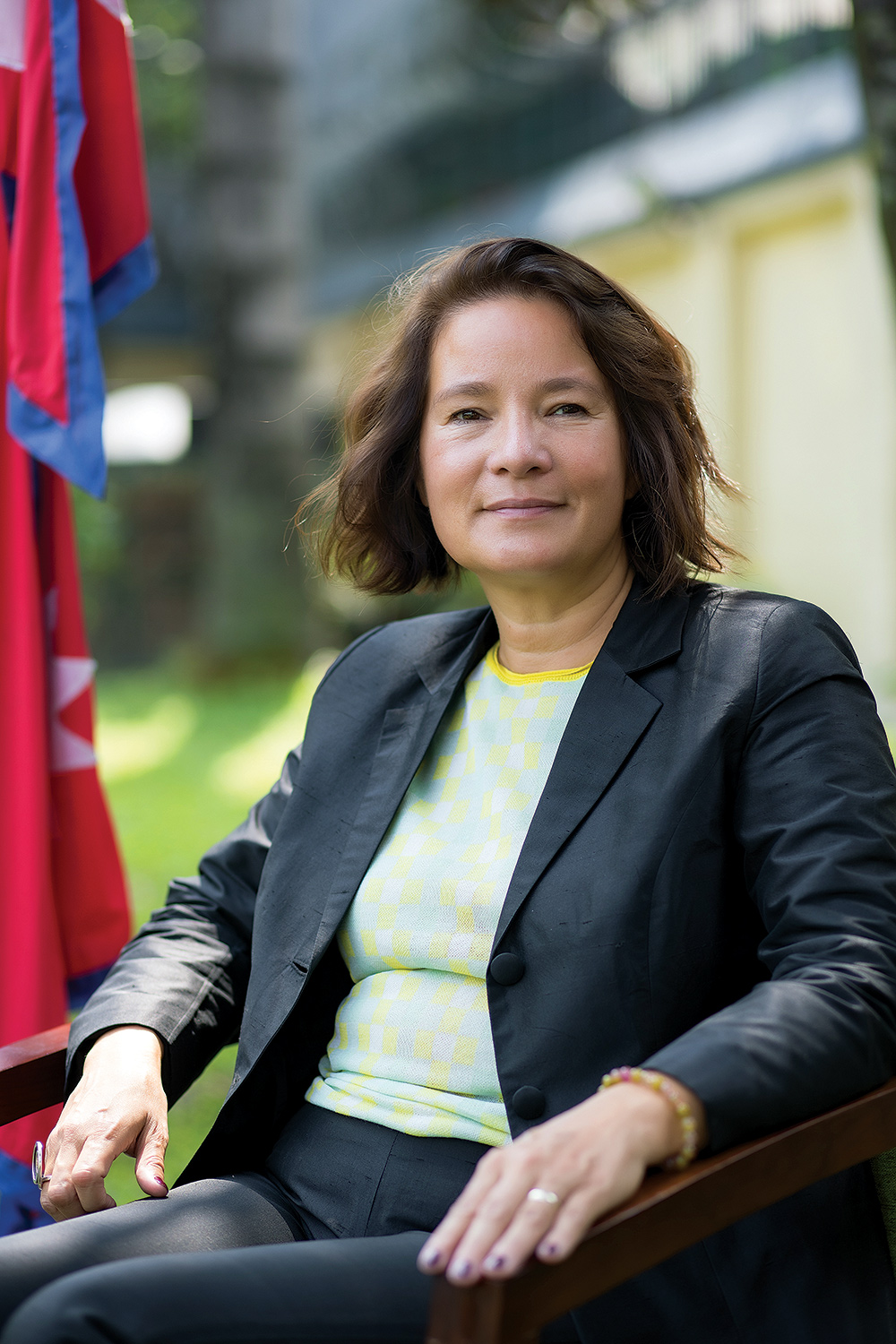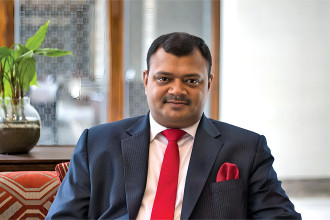
Nona Deprez
Ambassador, Head of Delegation of the European Union to Nepal
After being appointed Ambassador and Head of the Delegation of the European Union to Nepal, Nona Deprez presented her credentials to President Bidya Devi Bhandari on September 27, 2020. Since her appointment to Nepal, she has been actively engaged in strengthening the bilateral relations between Nepal and the EU through different ways. Deprez has made sure the diplomatic relations that Nepal and the EU have shared for nearly 50 years remain not limited to just development cooperation but is transformed more into a partnership. During her tenure, she has been actively engaged in meeting representatives of various institutions, civil society, private sector, media, international partners, among others. Having joined the European Commission about 24 years ago, Deprez says she is honoured to be appointed the EU Ambassador to Nepal. Business 360 recently had the opportunity to meet her and get insight on various national and international issues, especially in light of the Russia-Ukraine war and implications of new world order, EU’s development assistance to Nepal, and some of her learnings from her work tenure here. Excerpts:
EU is a major development partner of Nepal and is providing support to Nepal’s economic recovery. What are your major priorities for economic recovery of Nepal post Covid?
The bilateral relations that the European Union shares with Nepal go back nearly 50 years. We started out working mostly in development cooperation but at present, we are moving towards more of a partnership. The EU itself has its own economic growth strategy, which we call the European Green Deal. We strongly believe in modern technologies and when we mention modern it fundamentally means green technologies. We want to be the first continent to be carbon neutral by 2050. The European Union believes in green growth and green jobs, which are good not only for the health of the people but also for the planet and for prosperity. So, we are very happy to work with Nepal on green, resilient and inclusive development along with other development partners. It is encouraging to see that Nepal also has ambitious climate targets which it announced at the COP 26 held in Glasgow. We work with Nepal, especially on green growth, which I think is very important because it can bring about jobs and prosperity but at the same time not harm the planet. As Nepal is very vulnerable to climate change this green growth strategy is essential. We believe in working together with Nepal – the government, private sector and civil society – on green economic recovery. Any economic growth has to be sustainable for the long-term benefit of the nation. It has to be a whole of society and whole of government approach because whenever we speak about growth, we have to remember that it has to be sustainable, inclusive and resilient. This aspect needs to be taken into account so that the path from a least developed country to middle income country status is a sustainable one.
How do you view Nepal’s journey to graduation from least developed nation status by 2026?
Nepal decided it wanted to graduate from least developed nation status and took the necessary steps to do so. I believe it is a positive path and we are ready to support Nepal on this journey. As soon as Nepal has finalised its strategy for graduation, the European Union is ready to support it. I am currently the co-chair of the International Development Partners Group and as a group, it is also ready to support Nepal in its journey to graduate to middle-income country. However, Nepal obviously also needs to prepare for this graduation. We stand ready to support Nepal. The European Union has been providing certain concessional facilities like duty-free, quota-free to Nepal for its exports to the EU under the scheme called ‘Everything But Arms’. Once Nepal has graduated that will stop after a transition period of three years but Nepal could benefit from another system which is nearly equally beneficial and is called GSP+ (Generalised System of Preferences). This system is very much linked to green growth and decent work. That’s why Nepal will need to ratify and also implement some labour right conventions and also some international environmental law conventions. For instance, it would have to ratify the Labour Inspection Convention of the International Labour Organisation and also Freedom of Association and Protocol on Biosafety. These are some important conventions that need to be ratified and since it takes time to ratify and implement them, Nepal needs to immediately start working on it. The government, trade unions, employers’ unions and private sector, everybody needs to work towards ratifying and implementing those conventions so that Nepal can benefit from the GSP+ to still have very favourable conditions for its exports to the EU. Meanwhile, Nepal will not lose out on development assistance from the EU. Our new instrument is not necessarily linked to least developed country status and it totally depends on the performance of Nepal. We have a mid-term review in 2024, which will be a really good period to assess the progress towards graduation. There is another aspect of graduation, which is important and relates to the origin of products. Nepal also needs to build more integrated value chains with more of its products being produced in Nepal. In that context we are at the moment supporting the pashmina sector where we are hoping with our and the World Bank’s support pashmina production can be localised in Nepal instead of buying thread from abroad. 
Will the Russia-Ukraine war affect the funding assistance EU provides to Nepal?
So far, EU’s assistance to Nepal has not been affected. The EU at the moment along with other development partners is working with the Food and Agriculture Organisation, International Monetary Fund and World Bank in order to support food security and provide humanitarian aid in those countries that are in most need because of the effect of the Russian invasion of Ukraine. At present, EU is providing humanitarian support in Sri Lanka and not in Nepal because it is not needed here so far. And like I mentioned earlier, we will conduct a mid-term review in 2024 where we will assess our support to Nepal. For the moment we are processing our Annual Action Plan 2021 with the Nepali government. We are hoping that our financing agreements will be countersigned swiftly and that we can start implementing those.
EU has concluded the multi-annual indicative programme (2021-27) in line with the priorities of the 15th five-year plan of Nepal. Are you seeking any alignments from the government of Nepal, especially in the post pandemic context? What are the areas of focus for EU?
Absolutely, it is very important for us. We strongly believe that to have a meaningful impact you need to be aligned with country systems, country priorities and work a lot through the government systems. We provide a lot of budgetary support to Nepal because we believe that by doing so, we can reinforce the country’s systems. Hence, before drafting the multi-annual indicative programme we widely consulted the Nepali government. We have also held talks with the civil society, private sector, youths, women and other development partners. It is very important for us to be aligned with the government but it is also important that the priorities are common priorities. Nepal and EU share many common priorities in terms of green resilience, development and also human capital development. Actually, human capital development is the basis for everything, be it green growth, be it whatever. We will continue to support the education system in Nepal by working through the government priorities. We are working with the government on a new education sector strategy alongside other development partners. We want to promote quality in education hence we have been promoting teacher training programmes. We also want to promote diversity in education and make sure that everyone can access education. Moreover, we continue to work on nutrition as there is still an issue regarding this aspect in certain parts of Nepal. Nutrition or the lack of it affects other aspects too like education outcomes and thus the prospect of jobs. Hence, we have been continuing with our work on multi-sector nutrition. And the other crucial pillar of course is governance which is also the basis of everything. We thus lay a lot of emphasis on promoting rule of law, human rights, democracy, governance and in that we have a very strong component which is gender equality and this cuts across all our programmes. We are also working with civil society because we want to help civil society have a stronger voice in monitoring policies, policy implementation and in being part of the decision-making process. And we also support the implementation of the constitution with a strong focus on the rollout of federalism and public finance management.
Where do you think are we going wrong with the federal system? We have introduced the system but many feel it is not working properly.
Well, I think there have been very high expectations on the implementation of federalism in Nepal. We have to understand that it takes a long time to implement any new system but at the same time I think there is really momentum now and the roll-out of federalism should be accelerated. I believe the citizens have seen better service provision at the local level. There have been some excellent works done by mayors, deputy mayors and ward representatives. However, unfortunately, the parliament has been dysfunctional for the last year-and-a-half and so it has not passed a number of acts that are absolutely needed to implement federalism like the civil service act, education act, police act, to name just a few. I mean there are so many acts related to different sectors that need to be passed by the parliament. It is very crucial that parliament starts being functional again and starts examining and reviewing those laws. Certain laws have to be enacted so that provincial representatives can better exercise their mandate and that there is better respect for the respective mandate of the three layers of the government and better coordination between the different layers of the government. That is very important and should be worked on now. Again, I would like to repeat that expectations were very high. There has been some delivery but it needs to be accelerated. And of course, everyone needs to learn their role and this will take time. It is in human nature that those in power would be a bit reluctant to share their power. The Nepali constitution came into effect on September 20, 2015 and then there was an election in 2017. Then towards the end of 2019, we had the Covid 19 pandemic. So, we have to also take into account that there also has not been that much time to implement federalism. For instance, I am from Belgium, which is a federal country and we have been implementing federalism for the last 30 years. It will take time but we have to build on the momentum now. 
What were the major outcomes of the 13th Joint Commission Meeting between EU and Nepal?
That mechanism is mainly there to take stock of our relations, be it political, diplomatic, trade, or economic relations. We also take stock of our investments and development cooperation. It is necessary to review the progress in all of those areas and the meeting is a mechanism to share our common values and better understand each other. Both Nepal and the EU believe very strongly in the need to work on a multilateral system and on a rules-based international order. So, we inform each other about our efforts during the Joint Commission Meeting. It really is a platform for high-level dialogue to take stock of each other’s position and progress. At the last Joint Commission Meeting held in person in Kathmandu, we were very proud to welcome Paola Pampaloni, Deputy Managing Director for Asia and the Pacific of the European External Affairs Service in November 2021. During the meeting Nepal and the EU held discussions on the Covid 19 pandemic and on the possible cooperation in post-pandemic recovery. Similarly, Nepal conveyed its gratitude to the European Union for promptly extending the support of life-saving medical items and equipment when Nepal was struggling through the devastating second wave of the pandemic. Nepal also thanked the EU for its important contribution to the COVAX Facility. Meanwhile, we both agreed we would work together on reinforcing World Health Organisation measures to be better prepared for pandemics. Other issues we both agreed we would work together were on multilateral cooperation, climate change, and joining forces on global challenges. We also took this opportunity to inform the Nepali government on the progress of drafting our multi-annual indicative programme.
Nepal has long been corresponding with EU through political and diplomatic channels to lift the ban on aviation by EU. What are the major issues hindering this process?
Safety of people is the priority for everyone I suppose and it is for the European Union too. Nepal’s civil aviation still needs to make some progress in implementing safety standards. I know that in the past weeks a draft of the International Civil Aviation Organisation (ICAO) was shared with the media. The overall score of the Nepali aviation sector is a little bit better than earlier but if you look at the details then all of the sections that are related to safety have seen a regression. So, that is not good news if that draft ICAO bulletin is confirmed. The EU stands ready through our European Union Aviation Safety Agency to support Nepal in the implementation of the recommendations that will come out of this ICAO audit. Officially, the report will come out in three months, so our technical teams will be coming to Nepal in a few months’ time and it will then be clear what are the areas where we can best support Nepal’s civil aviation. However, there is still a major issue of accident investigation. In Nepal, there is an issue of conflict of interest between the oversight agency and handling services. Some countries have legislation that stops this conflict of interest. Some other countries have split their civil aviation authorities to make sure that this is handled by two separate civil aviation authorities. Nepal has made the choice to respond by splitting its civil aviation authority. This is a bill that has been in the parliament for the last five years. It has been passed by the National Assembly and it was on the agenda of the House of Representatives. However, it has not been discussed, so this issue of conflict of interest still remains. It is obviously a major issue that the authority that is in charge of the oversight is also involved in the handling processes. It is a major concern for safety. So as long as that bill or any other legislation that has the same effect is not passed and implemented there can be no progress on Nepal being lifted from the EU civil aviation safety list nor any specific Nepali private airline being lifted from the list. We are ready to support the Civil Aviation Authority of Nepal on this issue. It is very unfortunate that this bill has not been discussed at the House of Representatives.
Talking about the present international scenario what is the Russia-Ukraine war’s implication on geopolitics, emergence of a new world order and how countries negotiate political diplomacy?
The Russia-Ukraine war has certainly accelerated awakening of the European Union as a geopolitical actor. We have taken some very strong steps regarding this war. The European Union has acted in great solidarity and unity and also shown a lot of resolve and strength in fighting the Russian invasion of Ukraine. And many other countries in the world have joined in the fight to protect the values of the United Nations Charter and to safeguard international rules-based order, so that a UN member state cannot just trample on the territorial integrity and sovereignty of another UN member state. I think many countries in the world including Nepal have felt very strongly about protecting that international order based on law so that ‘might does not make right’. I think we have seen a lot of strong voices coming together to condemn the Russian invasion of Ukraine and to condemn Russian aggression and violation of international humanitarian law and international war law in Ukraine. And Nepal as a member of the United Nations Human Rights Council has also played its part there. So we are very happy to work with Nepal and other partners in the world to protect this multilateral order. We strongly believe that it is absolutely crucial to keep the world as we know it and join forces to work together on global peace and security. We also want to join forces and work together on climate change and for sustainable economic recovery or for that matter during times of pandemics. All of that needs a coordinated response and working together in cooperation. So, I think we have seen the reinforcement of the European Union as a strong voice due to the war. We are also seeing an acceleration in the EU of diversification away from fossil fuels. We want to diversify our sources of energy and our sources of dependencies. And that is subsequently accelerating the implementation of the green deal, of going more towards sustainable, renewable sources. I think we may see that in Nepal too. There is a shortage of even chemical fertilisers. Hence, I think moving more towards local bio-fertilisers in a reasonable manner, not by jeopardising harvest, is a move in the right direction for the health of our planet everywhere in the world. We are also seeing that. Unfortunately, at the same time, we are also seeing more and more of disinformation from state and non-state actors and on social media and that is also a negative evolution or development because of the war. Media play a very strong role in checking facts, countering that disinformation, making sure that we don’t relay whatever information we get. We need to check any information before we forward it. I think we are also working very strongly on that to counter any fake news or misinformation on the war in Ukraine.
What are some of your greatest learnings of Nepal from your term as the EU Ambassador? What are some your achievements? And what do you think you would have liked to do better?
I actually want to work on many areas. Despite the Covid, I have been able to travel outside Kathmandu. I have been very happy to travel around the country though not as much as I would have liked to and during these travels, I have had the opportunity to meet some wonderful people, especially the young people of the country who are so dynamic. Nepal’s youth makes up a sizeable proportion of the population and that’s excellent news for the future and also for the present. We need to give a stronger voice to these youths. Nepal is a very diverse nation and it has been wonderful to witness this diversity; to observe and interact with the diversity of the country. I would like to of course do more on that. During my tenure, I have been particularly proud of trying to have a stronger voice together with European Union member states as part of Team Europe and of course with our development partners and financial institutions such as the European Investment Bank. This I believe is a good move because we now have a stronger voice together. I have been also very proud of the solidarity that the EU has demonstrated in providing continuous support to Nepal, which was very evident during the pandemic. Fourteen EU member states have provided medical aid during the second wave of Covid. That is wonderful to see because, despite the fact that Nepal is far away geographically, Nepal is very close in the hearts of the European people. So, I hope that now since we are no more in the Covid situation there will be more people to people contact as Nepal is opening up. We also support Nepali students coming to share their experiences in Europe through the Erasmus Mundus scholarship. To say it all in one sentence we are very happy to work with Nepali people.
READ ALSO:






